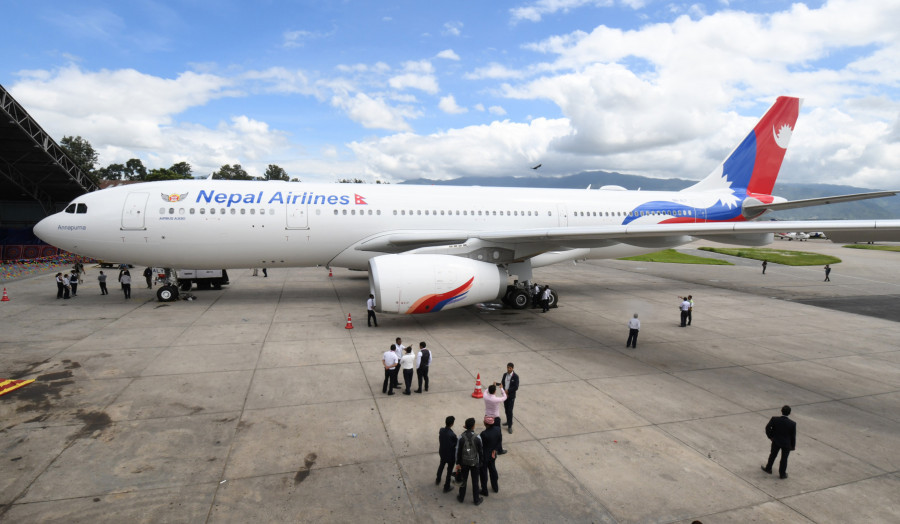Government is also considering allowing a limited number of scheduled flights from June.

International flights have been suspended until May 31 amid a surge in Covid-19 cases.
The government is mulling some changes to its Covid-19 travel restriction regulations that will allow the citizens to return home and fly abroad.
Amid soaring Covid-19 cases in the country, the government suspended international flights from midnight of May 6. Later, the suspension was extended until May 31 midnight.
Many Nepalis, including migrant workers, both at home and abroad, have been affected by the flight suspension.
But as per the latest decision, Nepali nationals can leave the country on chartered flights which have been allowed to fly into the country to rescue foreign citizens.
According to Buddhi Sagar Lamichhane, joint secretary at the Ministry of Culture, Tourism and Civil Aviation, Nepalis can buy tickets and travel abroad on chartered flights as per a ministerial decision of May 12.
“I believe many students and Nepali migrant workers have come home on vacation or for attending family functions and some even accompanied back their relatives who had gone abroad for treatment. With international flights suspended, they were stuck here,” said Lamichhane. “Such individuals can fly back on chartered flights that are available. Although the government’s priority will be to send foreign nationals safely back to their countries on special flights, Nepalis also can leave the country on such flights, space permitting.”
The government had allowed some chartered flights to evacuate foreign nationals although the regular domestic and international flights remain suspended for two weeks now. At the request of the foreign missions in Nepal, the government had allowed Turkish Airlines and Qatar Airways to operate some flights to rescue foreign nationals out of Nepal.
“There still are a few chartered flights remaining for evacuating foreign nationals. If Nepali citizens also want to go abroad on those scheduled flights, they can purchase tickets,” said Lamichhane. “However, priority will be given to foreign nationals. This also does not mean that the government is prioritising chartered flights.”
Despite the flight restriction, the government is still allowing two weekly flights from India. Likewise, Nepal Airlines and Himalaya Airlines have been given permission to operate chartered flights to ferry Indian nationals from Nepal to Saudi Arabia.
The operation of chartered flights for Indian nationals, who had come to Nepal to fly to Saudi Arabia, has drawn criticism, especially when regular flights from Nepal to countries like Saudi Arabia have been suspended for Nepali citizens.
“While thousands of Nepali migrant workers have been barred from flying to Saudi Arabia, the Government of Nepal has given a special privilege to Indian migrant workers to use the Kathmandu airport as a transit to Saudi Arabia and allowed ten flights to Saudi Arabia per week,” Nepal Association of Foreign Employment Agencies said in its statement condemning the government’s “unfair” decision.
Lamichhane, the joint secretary at the Ministry of Culture, Tourism and Civil Aviation, however, defended the government’s decision, saying the flights for Indian migrant workers were allowed on humanitarian grounds.
“Indian migrant workers had come to Nepal and got stranded here for weeks. Even they were working class people and had been facing hardships here,” said Lamichhane. “More than anything, they were allowed to fly to Saudi Arabia purely on humanitarian grounds.”
He added that the government was equally concerned about Nepali migrant workers who have been unable to fly to various labour destination countries.
The suspension of international flights has mostly affected Nepali migrant workers, as flights to and from major labour destination countries have also been suspended.
Nepali youths who were ready to migrate abroad to take up jobs and those who had planned to return home after their employment contracts expired have been hit hard by the travel restrictions.
Many Nepali workers have been left stranded without jobs and are struggling to make their ends meet as they are unable to return home.
In a bid to facilitate the movement of Nepali workers and others, the government is also considering allowing a limited number of scheduled passenger flights from June 1, according to Lamichhane.
Allowing limited passenger flights is based on the assumption that the Covid-19 situation will be normal by then, according to officials at the Civil Aviation Authority of Nepal.
The differences between chartered and scheduled passenger flights is that the fare for chartered flights will cost double the normal rate as they are normally a one-way flight and have to return empty.
These limited scheduled flights can operate to and from countries where chartered flights have already been allowed.
“For instance, one weekly flight can go to Turkey, two or three to Qatar. Likewise, one or two flights can operate to Malaysia and China. A couple of flights can also take place between Nepal and Saudi Arabia,” said Lamichhane. “The government is discussing this plan. Operating regular flights will not just mean carrying passengers but also bringing in essential medical supplies which the country needs. If there are certain scheduled flights, suppliers and donors can also make the required arrangements for sending supplies accordingly.”












